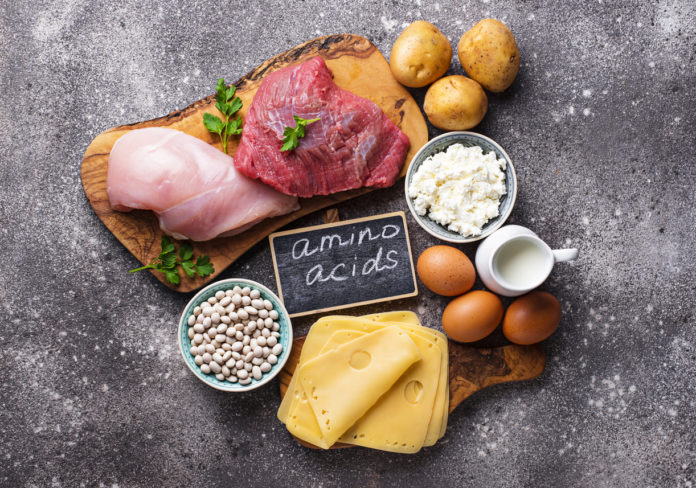Recently, people have become more curious about amino acids. There are thousands of proteins in our body, but they are made up of only 20 amino acids. Since the chemistry of how protein is synthesized is somehow hard to explain.
To put it simply, the body needs 20 amino acids to maintain at optimal health.
What are amino acids?
Amino acids are organic compounds that, when combined, help build protein in our body. When we eat a protein-based food, the body breaks it down into amino acids. Basically, there are two types of amino acids: essential and non-essential. There are 9 essential ones and they’re labeled essential because they can’t be produced by the body alone, so they have to be consumed through diet, and supplements can help also. Non-essential acids are the ones that can be produced by the body, even when we’re not eating enough of the foods that have them.
Your body won’t function as well without the right amount of amino acids. Amino acids basically, are the building blocks of protein. These proteins make up your muscles, the skin, and the tissues of your body. There are 2 types of proteins.
- Complete protein: A complete protein is a food that contains a sufficient quantity of all 9 of the essential amino acids. It can be found in foods like red meat, poultry, and fish. It’s also found in eggs and other dairy products.
- Incomplete protein: An incomplete protein does not contain a sufficient amount of all 9 essential acids. You can create a balanced meal, however, with both complete and incomplete proteins.
Amino acids carry out several functions such as helping prevent illness, building muscles, and transporting nutrients. Consequently, if there is a deficiency of these acids, the body can suffer from poor immunity, fertility problems, and digestive problems, and the deficiency can even cause slow growth in children.
The role of branched-chain amino acids (BCAAs)
BCAAs are a group of three essential amino acids, which are leucine, isoleucine, and valine. Of the three, leucine is believed to have the biggest impact on the body’s ability to create proteins that build muscle.
Concerning exercise and workouts, several studies show that low levels of protein and essential amino acids affect muscle strength and exercise performance. A joint study also revealed that amino acid supplements can help athletes recover after exercise.
It’s a common practice for people to consume BCAA supplements in order to boost muscle growth and enhance workout performances. These supplements can also help with weight loss, endurance, and the reduction of fatigue after a workout or exercise.
Though amino acid supplements can do all that and more, it’s important to note that they’re not classified as boosters and will not help you to actually improve your performance. Yet, logically, if you recover quickly from a workout, experience less physical and mental fatigue, and have more endurance and energy, your performance should improve.
BCAAs have also been shown to reduce muscle soreness. Since there are various types of BCAA supplements on the market, the first step is to check the reviews. You can find a list of the 5 best BCAA supplements in 2019 at Fitness Informant where they provide a detailed comparison, so you can know which type is suitable for you. It is worth mentioning that in some studies, participants who were given BCAA supplements “rated their muscle soreness levels as much as 33% lower than those given a placebo.” These results may not apply to everyone, of course, and each case is different, yet the chances of reducing muscle soreness to a certain degree are most likely.
Types of amino acids
There are many types of essential amino acids, and they include the following.
Leucine
It helps control blood sugar levels and assists in the growth and repair of muscles and bone. It’s also a main catalyst for healing physical wounds.
Isoleucine
It helps with wound healing, increasing immunity, blood sugar regulation, and hormone production. It’s mainly present in muscle tissues and controls energy levels. Older adults may be more prone to isoleucine deficiency than younger people.
Valine
It’s essential to having increased focus, improving muscle coordination, and giving you an emotional calm. People may use valine supplements for muscle growth, tissue repair, and boosting energy.
Threonine
Theronine plays an important role in having healthy skin and teeth. It’s a component of collagen, elastin, and tooth enamel. It helps aid fat metabolism and can benefit people who suffer from indigestion, anxiety, and slight depression.
Lysine
Lysine plays a critical role in building muscle, retaining bone strength, aiding recovery from injury or surgery, and regulating hormones, antibodies, and enzymes.
Histidine
This acid helps in the facilitation of growth, the creation of blood cells, and repairing tissues. Histidine is metabolized into histamine, which is vital for the digestive and immune system, as well as reproductive health.
Tryptophan
This is a precursor of serotonin and melatonin. Serotonin helps in controlling appetite, sleep, mood, and physical pain, and it’s found in some sleep aids. In otherwise healthy women, it can keep their mental and emotional energy in check. Melatonin regulates sleep. Tryptophan deficiency can cause a condition called pellagra, which is one stepping stone to dementia.
Phenylalanine
It helps the body use other amino acids, proteins, and enzymes. The body converts phenylalanine to tyrosine, which is a must for particular brain functions. Deficiency in phenylalanine is usually rare, but can lead to fatigue and memory problems in adults. It’s often the active ingredient found in diet sodas, in the form of aspartame, so large doses will increase phenylalanine in the brain affecting sleep or causing anxiety.
Amino acids are crucial for athletic and non-athletic people alike. Athletes depend on them to enhance their performances by feeling less fatigued and creating the ability to recover quickly from muscle soreness. Taking an amino acid supplement isn’t unusual because we don’t always eat properly to get those essential amino acids. Amino acid supplements increase endurance and muscle size, enhance performance because of feeling less tired and being able to recover quickly after workouts, reduce muscle soreness, and help you lose weight, and there is a bunch of other benefits to explore. Make sure you know which supplement is best for you and what you need it for.










